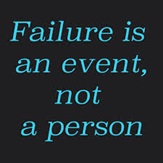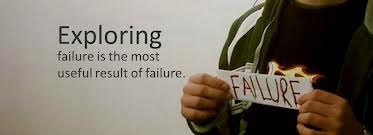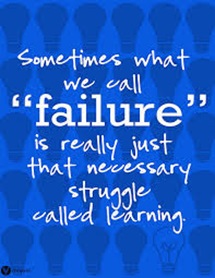Failure

In taking on commitment, be it establishing new habits of any sort—whether it is something seemingly as small as making the bed every day or something as seemingly large as starting a new career or entering into marriage– there will always be failures. That we will experience failure is not the problem, because failing to be consistent or perfect is inevitable. The problem we have with failure is that we think it is to be avoided at all costs, we think it means something negative about ourselves.
Remember:

And it is also important to remember that

Here is something which you might find useful. It is a different definition of failure. Consider this: Failure is either 1) having something you don’t want; or 2) wanting something you don’t have. The idea we have of failure is that is bad, that we have done something wrong, that we are ourselves wrong or insufficient. If we believe that we will then do everything in our power to avoid failure in order to not experience failure. What a terrible bind that is for our heart. But what if just consider for a moment that failure is either wanting something we don’t have or having something we don’t want—well, then we can explore what is missing and continue to take action. And we could be less afraid of failing because now failure gives us information and can inform our choices. Lord knows this way of thinking of failure isn’t easy and may not feel very natural. But think about this: When we were learning arithmetic and we said that 2+2 was 3, we were failing in that moment to understand. But it is the very mistake that is of immeasurable value to our success. It was only when we understood why 3 could not be correct that we become able to learn and see something we didn’t see before.
As long as we can practice being curious about our failures (which might grow easier as we remember failure is an event and not a judgment about us) that we can grow and learn.
When setbacks, missteps, and failures occur, instead of getting stuck in a downward spiral (which can sometimes be the worst kind of stuck), we can begin to course-correct, discover, and create magic along the way—improvisational flexibility becomes an essential art. Failures become a platform, a ladder, a means to fulfill the game we’ve taken on. What failure gives birth to, and what it attracts, what we can make happen, has the power to reshape the course of events.

